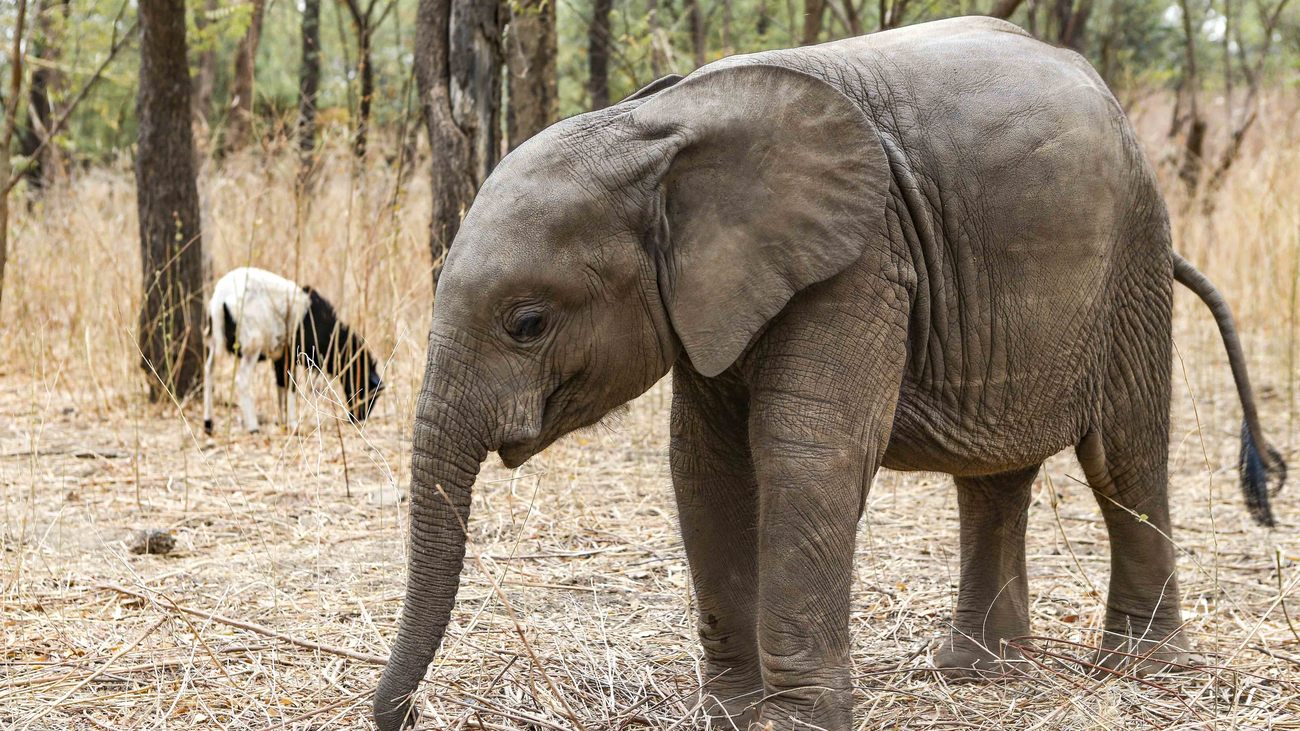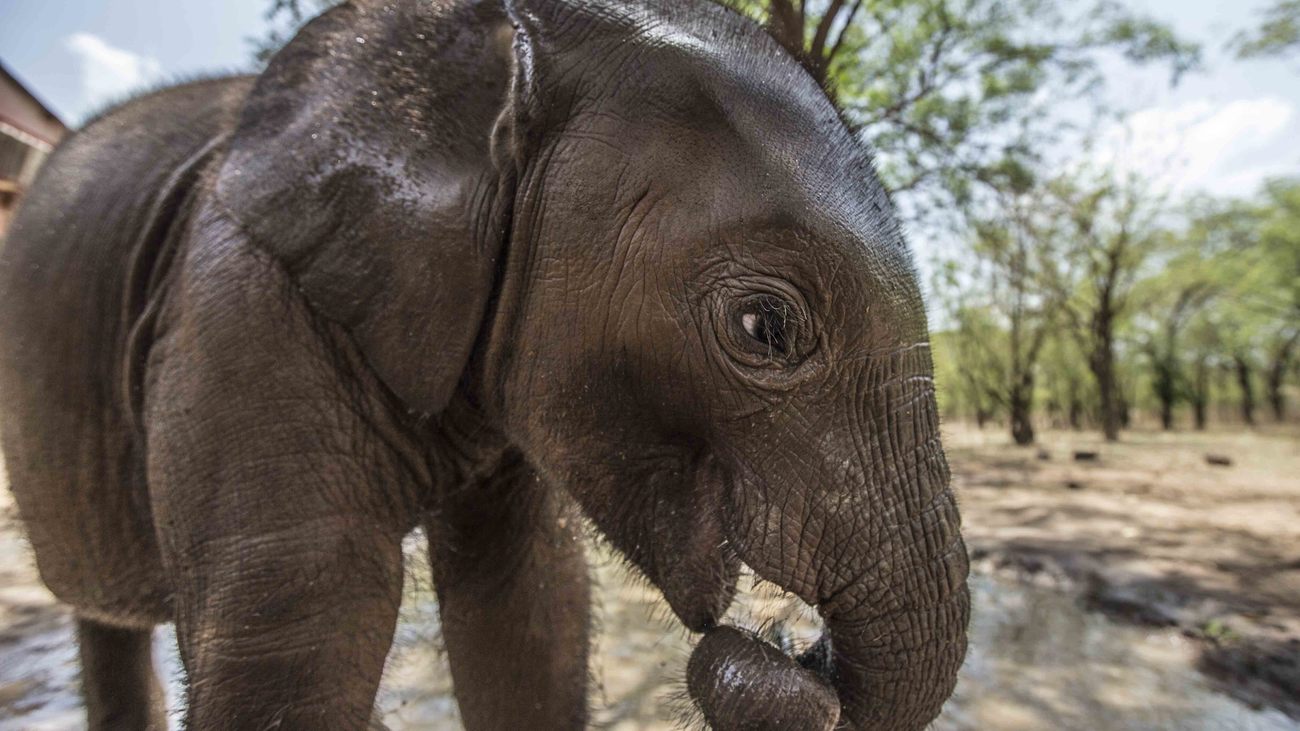Elephant Rescue and Rehabilitation Project - Burkina Faso
Saving one elephant calf can make a big differenceNania, a rescued elephant calf in Burkina Faso
Nania, a rescued elephant calf in Burkina Faso

Our goal has always been to release Nania back to the wild. Unfortunately, in the last two years, the area where Nania is being taken care of has become dangerous. Civil unrest and the increase in illegal mining operations, park encroachment, and disturbance of natural wild elephant movement have limited our ability to protect her and prevented her reintegration back into the wild.
IFAW’s hope is that Nania can soon relocate to a viable alternative location that offers greater protection, a permanent elephant population, and a home that is not facing the challenges of encroachment as her current location is. Such a relocation would include refurbishment of the boma, moving and settling keepers to accompany her, and our commitment to a future release plan back to the wild.
We believe that each individual animal is crucial to the survival of a species, and Nania’s story continues to carry that message against all odds.
Nania the elephant in good health at Deux Balés National Park
November 2023
Since becoming separated from her herd in 2018, making friends with Wisty the sheep, performing a DNA test to locate her family, and becoming acquainted with wild herds from afar, Nania the African forest elephant continues to grow safely and in good health at Deux Balés National Park, Burkina Faso.
The ultimate goal of Nania’s caretakers is still to release her back to the wild, hopefully with her natal herd. However, the human conflict and political uncertainty in Burkina Faso remains a challenge, as it has prevented wild elephants from passing through the area. This means that Nania cannot yet integrate into a new herd.
Right now, Nania is safest at Deux Balés. She is in the semi-release phase, which means she can go out into the bush under the supervision of her keepers. We continue to hope that the wild herd will return, which will allow us to continue the process of familiarising Nania with these other elephants and eventually integrate her into their family.
A DNA test of dung samples performed in 2021 suggests that Nania’s mother is still alive and a member of the nearby herd. Ideally, we will at some point be able to reunite Nania with her biological family.
Only about 6,800 elephants are left in Burkina Faso, and Nania’s species is critically endangered. Especially in cases like this one, every individual animal matters. IFAW is working with local authorities to review options for her potential return to the wild, prioritizing Nania’s safety and wellbeing.
Building confidence to meet the wild herd
July 2021
On several occasions, Nania has observed the wild herds and watched as individual elephants travel by her enclosure. At first, she was startled and scared of the wild herds, but now she is calm and does not run away. We are hoping that Nania's comfort and curiosity will grow to the point where she is eager to meet the wild elephants up close.
A match for Nania
February 2021
In October 2020, we shipped 17 test tubes to a conservation biology center at the University of Washington in Seattle. After four months of patiently waiting, we finally received the results. Nania is most likely the daughter of the elephant who produced dung sample 21!
The DNA analysis also confirmed a second key piece of information: Nania and her herd are forest elephants. The majority of forest elephants have long been thought to live in the Congo Basin in Central Africa, but Nania’s DNA results and similar research prove that the species’ range extends to the Sahel countries where they live alongside savannah elephants. With this new knowledge, the search for Nania’s family becomes a part of an even larger story. Nania carries hope for the survival of her species. Her release back into the wild and reunion with her herd holds the potential for more genetic diversity and stronger populations of wild forest elephants.
Finding Nania's family
January 2020
Our team has exciting news from the field: we recently spotted wild elephant herds passing through the forest! Why does this matter? Our goal is to unite Nania with her natal herd and there's a high chance that they are somewhere nearby.
IFAW's Céline Sissler-Bienvenu is hoping to find Nania's family with the help of something surprising: elephant dung! By collecting the dung of wild elephants and sending it to a lab for testing, we can compare Nania's DNA with that of nearby herds to see if there's a match.
Whisty and Nania get a new home
March 2019
Wherever Nania goes, Whisty the sheep isn't too far behind! You wouldn't guess that an elephant and a sheep have much in common, but the surprising duo have become the best of friends. We recently moved Nania (and Whisty) to a new site in Deux Balés National Park, farther away from local villages. At this new home, Nania will be able to explore her surroundings and better develop the skills needed to fully return to the wild. So far, the transition to this new project site has gone smoothly! Nania is loving her daily walks in the forest and enjoys playing in the water while Whisty watches from land.

A lost elephant and a village with a big heart
April 2018
Nania was just three months old when she lost her herd and wandered into a village in Burkina Faso. Determined to help the little calf, families and school children generously pooled together funds to provide food and care for Nania in the immediate days after her rescue. Realizing that the elephant would need professional care, local authorities reached out to IFAW for support. We hired four specialized caretakers (Idrissa, Souleymane, Salif and Abdoulaye) and created a long-term rehabilitation plan to help Nania return to the wild.
Caring for a young elephant is no simple task. Nania required around the clock attention, comfort from her caretakers, and feedings every three hours. With help from dedicated supporters, we raised the funds needed to purchase much-needed resources for Nania and are ready to embark on her journey together.
No one knows how to celebrate #InternationalMudDay better than Nania!
— ifaw (@ifawglobal) June 29, 2019
In addition to mud baths, the orphaned elephant calf loves playing with her caretakers as she undergoes rehabilitation to ready her for life in the wild. pic.twitter.com/mDCR1cNlxf
Nania the elephant in good health at Deux Balés National Park
November 2023
Since becoming separated from her herd in 2018, making friends with Wisty the sheep, performing a DNA test to locate her family, and becoming acquainted with wild herds from afar, Nania the African forest elephant continues to grow safely and in good health at Deux Balés National Park, Burkina Faso.
The ultimate goal of Nania’s caretakers is still to release her back to the wild, hopefully with her natal herd. However, the human conflict and political uncertainty in Burkina Faso remains a challenge, as it has prevented wild elephants from passing through the area. This means that Nania cannot yet integrate into a new herd.
Right now, Nania is safest at Deux Balés. She is in the semi-release phase, which means she can go out into the bush under the supervision of her keepers. We continue to hope that the wild herd will return, which will allow us to continue the process of familiarising Nania with these other elephants and eventually integrate her into their family.
A DNA test of dung samples performed in 2021 suggests that Nania’s mother is still alive and a member of the nearby herd. Ideally, we will at some point be able to reunite Nania with her biological family.
Only about 6,800 elephants are left in Burkina Faso, and Nania’s species is critically endangered. Especially in cases like this one, every individual animal matters. IFAW is working with local authorities to review options for her potential return to the wild, prioritising Nania’s safety and wellbeing.
Related content
Our work can’t get done without you. Please give what you can to help animals thrive.